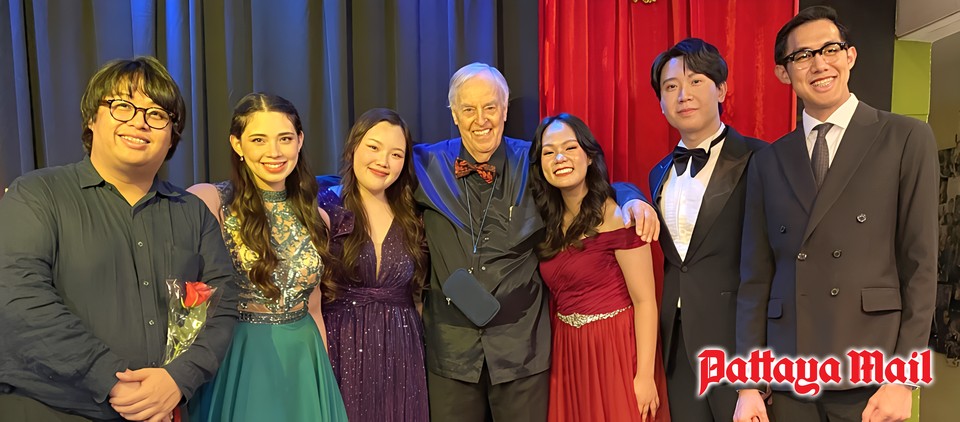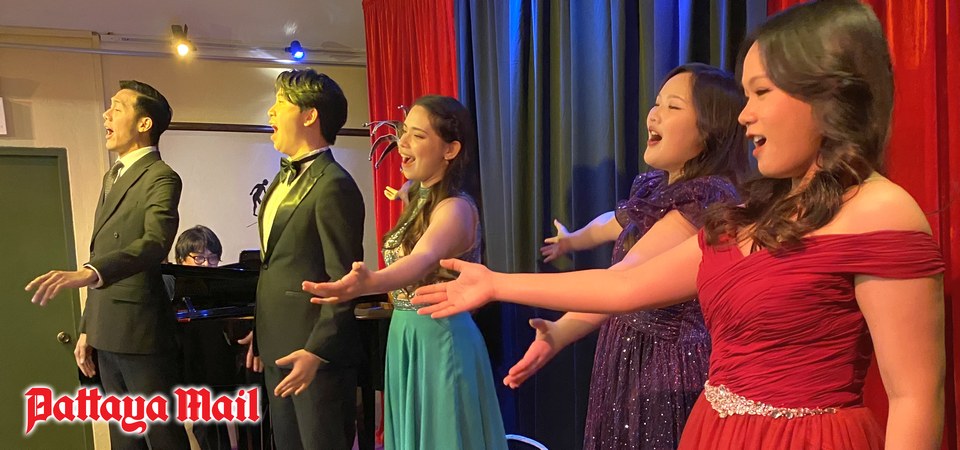
PATTAYA, Thailand – Vocal concerts are always popular events at Ben’s Theater, attracting capacity audiences. The most recent one, entitled A Vocal Extravaganza was no exception. The five singers are advanced students of Professor Nancy Tsui-Ping Wei, voice teacher at the College of Music, Mahidol University and are also members of her Voice Studio in Bangkok. They included Pichamon Mookmaneekun (soprano), Alisara Arial (soprano), Pimmada Ko-amornsup (soprano), Maotong Shen (tenor) and Jatuphol Nuanjan (bass-baritone) and they were accompanied as usual by the talented concert pianist Anant Changwaiwit. Their programme was varied, well-balanced and thoughtfully planned with care given to continuity. Impressively, every item on the programme was sung from memory.
The concert opened with the ever-popular Vilja Song from the 1905 operetta The Merry Widow by the Austro-Hungarian composer Franz Lehár. It was sung by Pichamon who has excellent intonation with her top notes clear and bell-like. She has good stage presence too and excellent timing – that ability to “place” the notes in the most expressive way. I enjoyed the imaginative off-stage voices too. Jatuphol made a confident and assured appearance to sing Non più andrai (“You shall go no more”) from Mozart’s timeless opera The Marriage of Figaro. He brought excellent characterization to the part and virtually acted the aria as well as singing it, accompanied by a sparkling piano accompaniment from Anant. It was delightful to see how Jatuphol’s stage presence and confidence have developed so much.
Alisara Arial charmed the audience from the moment she stepped on the stage and displayed her powerful tone quality, excellent intonation and phrasing in Puccini’s Quando me’n vo (“When I go my way alone”) from La Bohème. First performed in 1896, it’s probably the composer’s most popular opera and Alisara gave a compelling performance with excellent audience contact and stage presence. Maotong Shen made his debut appearance at Ben’s Theater with Dein ist mein ganzes Herz (“You are my Heart’s Delight”), an aria from the 1929 operetta The Land of Smiles with music by Franz Lehár. It was an appropriate choice for Maotong because part of the opera is set in China. For many years, the aria was associated with the tenor Richard Tauber for whom it was written. Maotong has an attractive and pleasing light tenor voice; he sings with excellent intonation and his smooth tone quality was perfect for the quieter passages in the song.
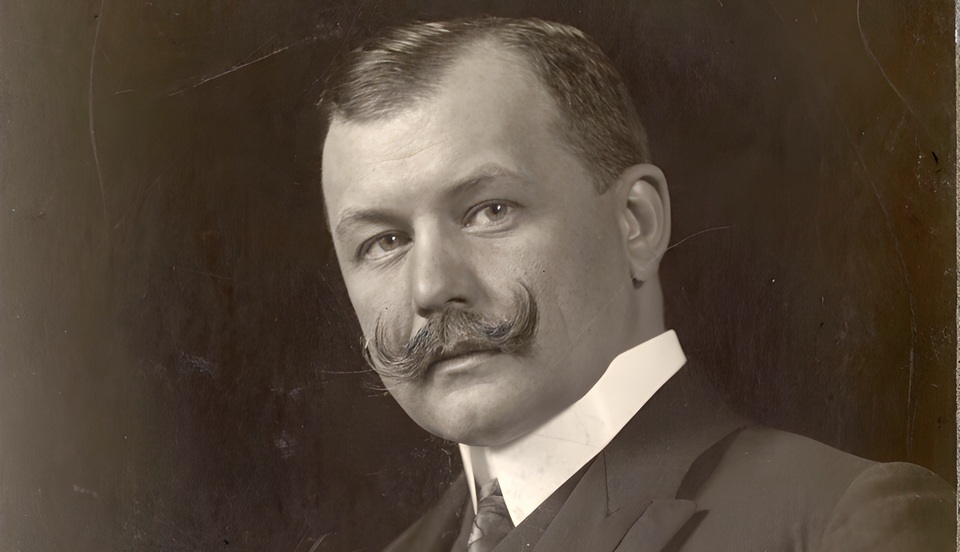
Les Chemins de l’Amour (“The ways of love”) is a kind of song-waltz written in 1940 by the French composer Francis Poulenc. It is charming song but with its own musical challenges. Pichamon gave a careful performance of the song with a good sense of phrasing and vocal control.
Erlkönig (“The Erlking”) is a dramatic song composed by Franz Schubert in 1815 and well-known for its physically exhausting piano accompaniment, consisting of rapid triplets in the right hand that continue throughout. Schubert took the words from a poem by Goethe and the song was originally written for solo voice and piano. Unusually, the singer takes the role of four characters, a narrator, a father and his son and the Erlking, an unpleasant supernatural entity. Not only is the piano part a challenge, the vocal part too has many technical difficulties to overcome. It therefore made sense to divide the original solo part into four individual characters played by Pichamon, Pimmada, Maotong and Jatuphol. Anant handled the demanding piano part impressively. Pimmada, in her first appearance of the evening, stood out among the ensemble singing the role of the Erlking with her attractive lyrical tone quality.
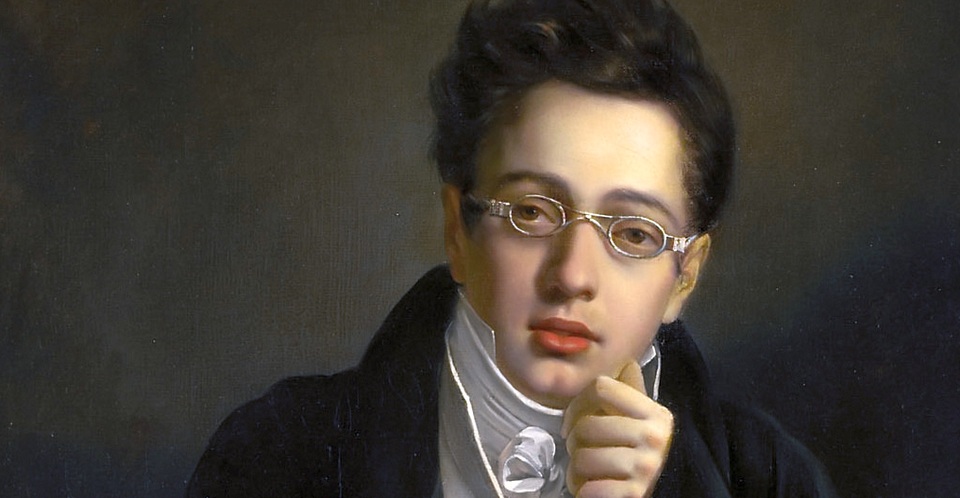
Amazingly, Schubert composed the song when he was only eighteen, and it was said that he completed the entire piece in a few hours one afternoon. It was to become one of his most famous compositions.
Jatuphol sang the attractive song Stars from Les Misérables, the popular 1980 musical with music by Claude-Michel Schönberg. Jatuphol gave a compelling performance, well-phrased and with good diction. Pichamon and Maotong sang Lippen schweigen (“Lips are sealed”) another well-known number from Lehar’s The Merry Widow. The piano introduction began before the singers appeared on the stage, a sensible approach which enabled the vocalists to walk on and start singing immediately, rather than stand on the stage doing nothing. The piece was well-staged (with a waltz included) and the voices of Pichamon and Maotong blended exceptionally well. The first half of the programme ended with a song by the Chinese composer Xinquan Zhou entitled The Joy of the Snowflakes. It’s a delightful piece and there was excellent ensemble work with some well-blended close harmony.
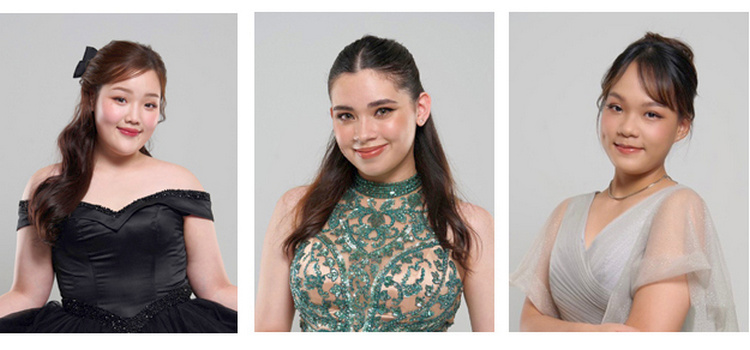
It was a pleasure to see and hear how the singers’ technique and stage-craft has developed since their previous appearance in Jomtien. Pichamon was born in 2002 and began singing lessons at an early age. In a Catholic school for twelve years, she developed a profound appreciation for music, leading to her enthusiastic participation in choral singing. She has taken part in many vocal competitions during her primary and secondary education and won many prizes both in Thailand and abroad. Pimmada graduated from Satit Prasarnmit Demonstration School Bangkok in 2023. Born in 2005, she started learning music at the age of seven and began classical voice study in 2021. She recently won first prize at the Princess Galvani Vadhana Institute of Music Voice Competition. Alisara was born in 2003 in Washington, USA and started viola lessons at the age of nine. At fifteen, she began taking voice lessons and since then, she has participated in many concerts and competitions. She was a successful finalist in a recent Osaka International Music Competition in Japan, where she received the Espoir Prize in 2023.

The concert featured the first appearance at Ben’s Theater of tenor Maotong Shen who was born in 2000 in Handan, Hebei Province, China. At the age of eighteen he entered Langfang Normal University and obtained a Bachelor degree in music performance. In 2023, Maotong was admitted to the College of Music at Mahidol University to pursue his Master degree. The same year, he joined the Heavenly Voice Singers and in 2024, performed with the Thailand Philharmonic Orchestra in the Thailand International Composition Festival. Jatuphol has made several previous appearances at Ben’s Theater. Born in the year 2000, he began studying trombone at the age of ten. In 2016, he began studying classical trumpet. From an early age, Jatupol has had a passion for singing. In 2021, he was one of the finalists at the Osaka International Music Competition in Japan and won a major prize at the Bangkok International Performing Arts Vocal Competition.
The second half of the programme opened with a lively, dramatized version of Wie die Weiber man behandelt? (“How are women to be treated?”) another number from The Merry Widow. It’s a march-like ensemble piece that featured all the singers and turned out to be a delightful romp that received and enthusiastic response the audience. Jatuphol provided a thoughtful performance of Vi ravviso o luoghi ameni (“O lovely scenes, again I see you”) from Bellini’s opera La sonnambula which was first performed in 1831. He sang with good intonation and sense of phrase and he was supported by particularly expressive playing from Anant. Pimmada gave a lovely performance of Luigi Arditi’s vocal waltz Il bacio (“The Kiss”). Luigi Arditi was an Italian violinist and composer who wrote numerous songs and vocal waltzes. The song displayed Pimmada’s light voice and her excellent intonation and technique. She was brilliantly supported by a superb piano accompaniment from Anant, whose sensitive playing really caught the waltz-like mood of the piece.
Maotong sang La fleur que tu m’avais jetée (“The flower you threw at me”), a tenor aria from Bizet’s opera Carmen. Maotong’s gentle, lyrical voice was ideal for this melancholy song and splendid in the pianissimo passages. William Elden Bolcom is a prolific American composer and Amor is one of his cabaret songs, full of humour and amusing imagery. It was sung vivaciously by Alisara who grabbed the audience’s attention the moment she began. She delivered this song with splendid characterization and a natural stage presence and was given a lively accompaniment by Anant, with catchy syncopated rhythms in the piano part.
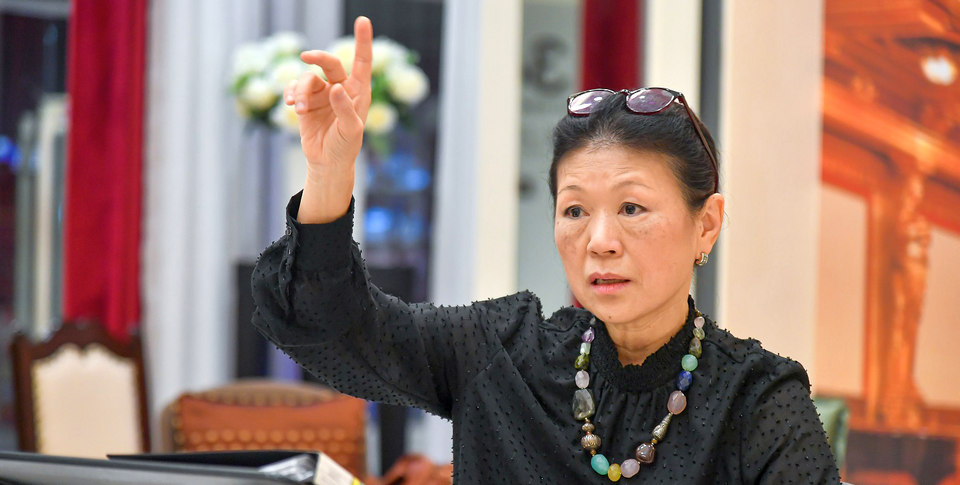
In complete contrast, Maotong and Jatuphol performed Au fond du temple saint (“At the back of the holy temple”) from Bizet’s opera The Pearl Fishers. Their voices blended perfectly during the shifting chromatic harmonies of the duet, enhanced by a sensitive piano accompaniment from Anant. Pichamon gave a lively performance of Spiel ich die Unschuld vom Lande (“If I play the innocent peasant maid”) from the Johann Strauss opera Die Fledermaus. She sang with good characterization and managed the tricky vocal leaps with confidence.
Mozart’s song for three voices entitled Das Bandel (“The Ribbon”) was written in the Viennese dialect and it’s a comic piece involving a lost hat ribbon. Alisara, Maotong and Jatuphol gave a compelling, dramatized performance with planned stage movements, excellent vocal ensemble and amusing characterisation. The final item on the programme was the famous Drinking Song from Verdi’s 1853 opera La Traviata and featured all five singers. Libiamo ne’ lieti calici (“Let’s drink from the joyful cups”) is a duet with chorus and one of the best-known melodies in the entire operatic repertoire. It was well-staged and acted and the singers interacted splendidly with each other in some excellent ensemble work. They seemed to know how to “work the audience” for this rousing number and received wild, unbridled applause.
As an encore, there were a couple of dramatized numbers from My Fair Lady sung effectively and pensively by Jatuphol and Pichamon followed by a lively and rousing performance of the ever-popular Neapolitan song O Sole Mio (“My Sunshine”) which was performed with a great deal of vivacity and abandon, much to the delight of the audience. It brought the concert to a terrific conclusion.
